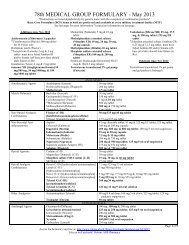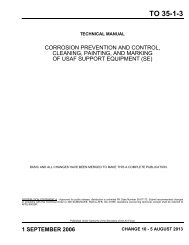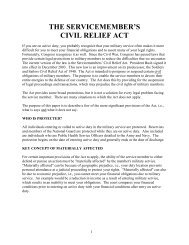Legal Residence and Domicile Explained
Legal Residence and Domicile Explained
Legal Residence and Domicile Explained
You also want an ePaper? Increase the reach of your titles
YUMPU automatically turns print PDFs into web optimized ePapers that Google loves.
LEGAL RESIDENCE AND DOMICILE<br />
This pamphlet answers frequently asked questions about changing legal residency. Because<br />
changing one’s residency can have serious consequences, you should contact the legal office for<br />
advice on specific questions.<br />
DEFINITIONS<br />
The terms “home of record”, “domicile”, “legal residence”, <strong>and</strong> “residence”, are often confused.<br />
While your “home of record” cannot be changed because this is the place you were living when<br />
you entered the military, your “domicile”, “legal residence”, <strong>and</strong> “residence” can be changed.<br />
Basically the terms “domicile” <strong>and</strong> “legal residence” refer to the same place – the state you<br />
consider your permanent home. On the other h<strong>and</strong>, your “residence” is simply where you are<br />
living at a particular time.<br />
WHAT IS YOUR DOMICILE ?<br />
Every person acquires the legal residence of their parents at birth <strong>and</strong> keeps this domicile until,<br />
after reaching the age of majority (usually 18 years old), they acquire a new one of their own.<br />
Members of the armed forces do not lose their domicile merely by joining the service <strong>and</strong><br />
moving about from state to state or abroad in response to military orders. They retain the<br />
domicile they held at the time they entered the service, unless they indicate that it is their<br />
intention to remove their domicile to some other state in which they are residing. A person’s<br />
choice of domicile will determine many of his or her legal rights <strong>and</strong> obligations.<br />
Many factors affect a person’s decision to become a legal resident of a particular state. Taxation<br />
is often a service member’s primary consideration in choosing their domicile.<br />
In order to determine what your present legal residence is, you will need to consider the next<br />
section, which explains how you might have changed your legal residence in the past <strong>and</strong> how<br />
you may change it in the future.<br />
HOW DO YOU CHANGE YOUR LEGAL RESIDENCE?<br />
A person acquires a new legal residence by being physically present in a state with the intent to<br />
reside there permanently or indefinitely. Individuals in the military must intend to return to that<br />
state as soon as their military obligations are completed. This is all that is required, but showing<br />
the intent may be difficult. Acts that indicate the state of legal residence include owning<br />
property in that state, voter registration <strong>and</strong> actual voting in elections, the claiming of a<br />
homestead exemption, the place motor vehicles are registered, where driver’s licenses are<br />
obtained, the payment of state income tax, <strong>and</strong> the exercise of other benefits or obligations of a<br />
particular state. Merely purchasing a new home in a new state or moving to a state under<br />
1
military orders does not necessarily indicate that you have changed your legal residence.<br />
Claiming the state homestead exemption will affect your legal residence.<br />
Moving overseas does not change your legal residence <strong>and</strong> it is virtually impossible to change<br />
your legal residence once you are overseas.<br />
The acts described above may be interpreted by authorities as expressing your choice of legal<br />
residence. Therefore, you are advised to vote, exercise your rights, <strong>and</strong> claim the benefits of<br />
legal residence only in the state where you intend your domicile to be, unless you intend to<br />
ab<strong>and</strong>on your old legal residence <strong>and</strong> establish a new one.<br />
Voting is considered the most important indicator of intent in most states. While voting<br />
“absentee ballot" may be inconvenient, you should make the effort if your “residence” is not the<br />
state in which you are stationed.<br />
A military spouse does not automatically assume the “legal residence” or “domicile” of the<br />
military member. While many states require the non-military spouse to obtain residency in the<br />
state in which they are living, they may still be able to vote in another state <strong>and</strong> maintain<br />
residency in the other state. Non-military spouses will have to pay income tax on their income<br />
earned in whatever state they are stationed. To maintain residency in another state the nonmilitary<br />
spouse should file two tax returns, one in the state assigned <strong>and</strong> one in the state of<br />
residency.<br />
Remember that in addition to establishing your liability for state income taxes, your domicile or<br />
legal residence determines many other important matters. Each of the following will be affected<br />
by the law of your state of legal residence:<br />
Liability for the state inheritance taxes<br />
The jurisdiction where your will must be probated <strong>and</strong> the resulting consequences<br />
(including who may act as your executor or guardian of your minor children)<br />
The right to vote<br />
The right to hold public office<br />
The right to homestead<br />
Determination of whether you or your children may attend a state college without<br />
paying higher fees required for out-of-state legal residents<br />
The family relationship, including the rules on property rights, divorce, <strong>and</strong> marriage<br />
annulments.<br />
Liability for state personal property taxes<br />
Eligibility for public welfare<br />
If you have any difficulty in determining what state is your legal residence or have other<br />
questions, contact the legal office for assistance.<br />
2

















